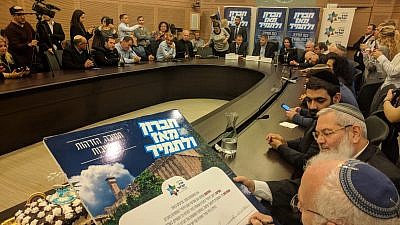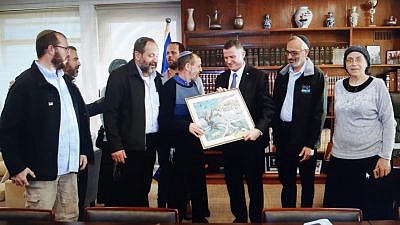
Knesset members, ministers vow to strengthen Jewish solidarity in Hebron
“We will certainly continue to strengthen sovereignty where our patriarchs and matriarchs are buried,” said Knesset member Yoav Kish, referring to Me’arat Hamachpelah, the ancient tomb of Jewish forebears Abraham, Sarah, Isaac, Rebecca, Jacob and Leah.
(December 25, 2018 / JNS) A conference honoring the Jewish connection to the ancient city of Hebron took place in the Knesset on Monday, drawing more than 50 Knesset members who signed a pledge that confirmed their “deep solidarity with the roots of the Jewish people in Hebron,” just days before a conference organized by an Arab Knesset member was set to call for the expulsion of all Jews from the city.
The attendees were primarily from the Likud, Jewish Home and Shas parties, and included Knesset Speaker Yuli Edelstein, Minister of Education Uri Ariel, Minister of Housing Yoav Galant, Minister of Justice Ayelet Shaked, Minister of the Interior Aryeh Deri, Minister of Environment Ze’ev Elkin, Minister of Social Equality Gila Gamliel, Minister of Science Ofir Akunis, Minister of Foreign Affairs Tzipi Hotovely, Deputy Minister of Defense Eli Ben Dahan and many others, as well as heads of the Samaria Regional Council, Binyamin Regional Council, Yesha Council, and leaders of the Kiryat Arba and Hebron communities.
Organized by the Knesset Land of Israel Lobby, the conference culminated in the signing of a large document that reads: “We, the undersigned, hereby express deep solidarity with the roots of the Jewish people in Hebron and the support of the Jewish community in Hebron that has clung to the city despite all the difficulties. We declare an unambiguous commitment to the continued existence, security and prosperity of Hebron as the city of both our forefathers and children.”

“Elections come and go, but Hebron is forever,” MK Yoav Kish told attendees. “Hebron is the heart of the Jewish community, an integral part of the Land of Israel and the people of Israel.”
“We will certainly continue to strengthen sovereignty where our patriarchs and matriarchs are buried,” he added, referring to Me’arat Hamachpelah, the ancient tomb of Jewish forebears Abraham, Sarah, Isaac, Rebecca, Jacob and Leah, which sits atop a massive Herodian structure.
Kish and other attendees also called for the revocation of the Temporary International Presence in Hebron (TIPH) mandate in the city, saying the group which was founded to report on potential violations of international law by Israeli forces in the mid-1990s is anti-Israel and no longer serves its mission.
A leaked TIPH document obtained by Haaretz revealed TIPH’s opposition to the opening of an archaeological park in Hebron, due to their concern that it showed a Jewish connection to the ancient city.
‘A litmus test’
Event co-organizer MK Betzalel Smotrich said “Hebron is a litmus test. What is happening in Hebron shows our Jewish pulse.”
He warned that those who call for the eviction of Jews from Hebron “understand very well that if Hebron grows and develops, the entire settlement enterprise will grow and develop, so they invest in harming Hebron. But they will continue to shout and complain while we will continue to build, reach the people and connect with our roots.”
In November, Speaker of the Knesset Edelstein blocked Arab MK Ayman Odeh from holding “Hebron First,” which called for the expulsion of all Jews from the city of Hebron as a first step in the eviction of Jewish communities from Judea and Samaria. Attendees were to include Dov Henin of the Joint List, as well as Michal Rozin of Meretz, Arab residents of Hebron, and representatives of left-wing organizations Breaking the Silence, B’Tselem, Yesh Din and Peace Now.
It was to be B’Tselem director-general Hagai El-Ad’s first address at the Knesset since he made a speech accusing Israel of war crimes at a meeting of the U.N. Security Council.
According to “Hebron First” organizers, “the settlement in Hebron is an expression of an extreme government policy that pours huge budgets and endangers human life in order to strengthen and preserve a handful of extremist settlers.” The conference was rescheduled for Dec. 31.

At the event in support of Hebron’s Jewish presence, Edelstein blasted “Hebron First” organizers for calling to make Hebron “Judenrein,” or devoid of Jews.
“They are right; Hebron is indeed first,” he said. “So why are they trying to hurt Hebron? Because they know that this is the heart … anyone who has seen the tens of thousands of Jews on Shabbat Chayei Sarah understands what Hebron means for the people of Israel. They say there are only 800 Jewish residents of Hebron, but on Shabbat Chayei Sarah there are over 30,000 visitors—young, old, Ashkenazi, Sefardi, religious and non-religious.”
Calls for reallocating UNESCO dues’ money to a museum of Jewish heritage in Hebron, improved handicapped access at the Tomb of Machpelah, the centrality of women in the development of Hebron, the addition of more bus lines and increasing funding to the city were all topics raised by additional ministers and Knesset members at the event.
“During our event, the decision was made that Israel is going to elections, which means everyone in attendance was about to be fighting for their job. Yet one Knesset member and minister after another said elections go, but Hebron is forever,” said director general of the Jewish community of Hebron Uri Karzen.
“We have the tremendous merit to be among those who helped build Hebron and preserve it for the Jewish people,” he said. “As we receive blessings from the Knesset to Hebron, we return those blessings, and hope it will be a good election for the Jewish nation.”